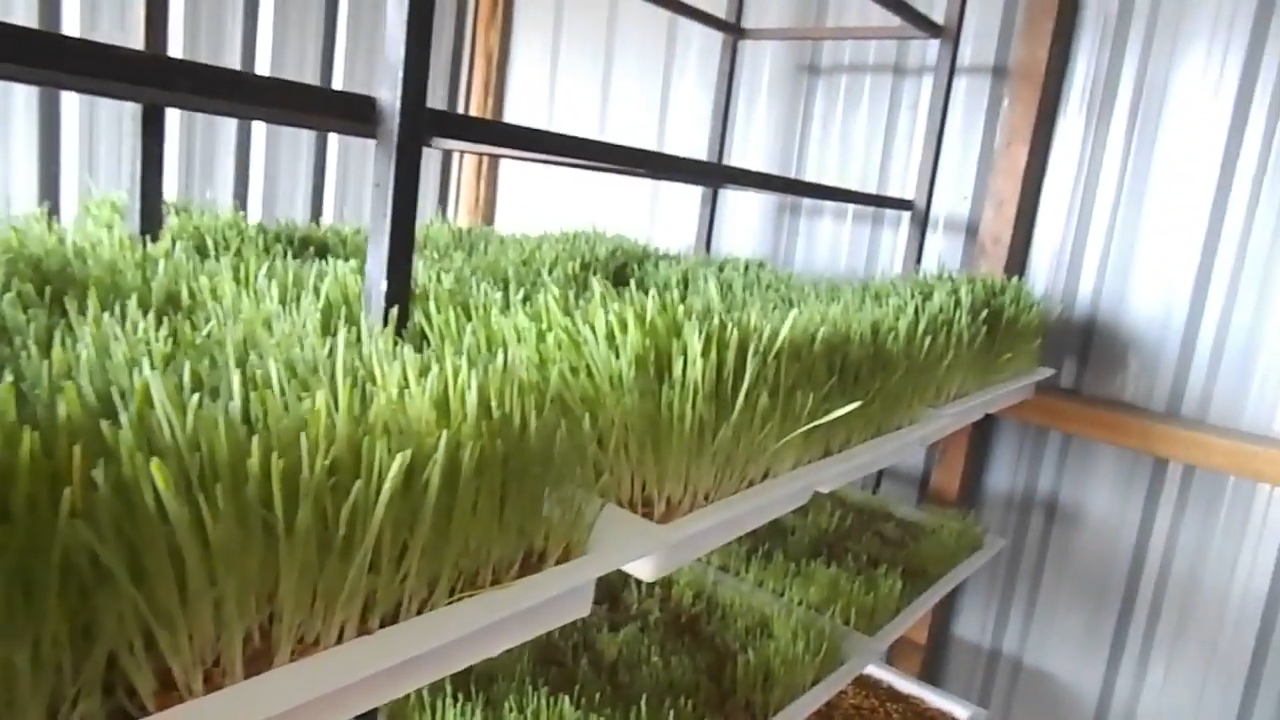
By George Munene
Through hydroponic farming, Peter Muiruri, a poultry farmer at Kitengela has been able to cut his feeding costs by over 40 per cent.
While it costs other farmers Sh700 to feed 100 chicken each consuming 140 grams in a day, Peter spends nearly half of this, Sh400 by substituting nearly 60 per cent of store-bought feeds with his own homegrown hydroponic fodder. This ensures he keeps his cost margins low and reaps handsome returns from his poultry venture.
Due to its high protein content, in the two and a half years he has employed hydroponics, Peter who supplies supermarkets with kienyeji eggs says he has seen tremendous improvement in the immunity of his flock. He points out that he rarely has any cause to use any antibiotics for his chicken. “The growth rate of my birds far surpasses what I archived while feeding them on commercial feeds. Hydroponic fodder coupled with the greens I grow to feed my birds has also ensured I produce authentically kienyeji eggs without resorting to using any additives,” he explains.
Hydroponic farming refers to the growing of plants without soil but rather the use of water-based nutrient-rich solutions fed to plants with water ensures the speed at which they germinate is increased greatly.
Related News: Farmer increases eggs 60% with homemade azolla plant protein
Related News: Kilifi farmer unable to meet growing brahma chicken demand
The main implements you will need to set up a hydroponic system of your own are trays, seeds (planting material), and water.
With the cost of feeds having gone up by nearly 38 percent over the last four months, from Sh1850 to Sh2550. This has seen many poultry farmers wave goodbye to their poultry fortunes with production cost being unmanageable for most small-scale farmers. More than ever, alternative sources of poultry feed such as hydroponics are vital to ensure chicken rearing remains profitable.
Eight to 10 kilograms of hydroponic fodder can be produced in six to seven days at a cost of just Sh12.5 a kilogram. For Muiruri, three trays; 30-24-kilogram worth of fodder, is a sufficient daily feed supplement for his 800 birds, making hydroponics a low-cost source of high-quality nutrients.
For a standard daily chicken ration intake of 140 grams, 70 per cent of this can be replaced with hydroponic fodder in kienyeji chicken and 30 per cent for broiler and layer chicken.
“Farmers should however be advised to progressively increase the amount of hydroponic fodder substituted for commercial feeds, gradually observing their bird's production levels and settle at the point where they achieve maximum production,” Peter counsels.
Hydroponic fodder should also be introduced to chicks while they are young, i.e., at two months for them to be used to these feeds and avoid shocks caused by a sudden change in diet.
The seeds can be those of barley, wheat, oat, maize, sorghum amongst other cereals. The selected seeds should not have overgrowths and be chemical-free. Wheat and barley have over 20 per cent protein content, the standard required by chicken, making them the more preferable options.
To prepare his seeds he soaks them in jik for 30 minutes to two hours. They are then washed and rinsed to remove any jik residue. Seeds are further soaked for between four to 12 hours before being drained and incubated in a bucket for two days after which their roots will have sprouted and they will be ready for planting.
Planting is done by spreading the germinated seeds on the plastic trays--this can be store-bought or homemade. A 40cm by 1M tray will normally hold about two kilograms of planting material which in a week's time will give you 8 to 10 kilograms of fodder.
Related News: Nandi farmer’s politics failure births 200 chickens, 70 sheep farm
Related News: How to grow own black soldier larvae for feeding indigenous chicken
Watering should then be done every four or three hours until seven/six in the evening, this will be dictated by the climate which affects the rate of evaporation. The seeds and plantlets are watered for six to seven days depending on the fodder’s eventual use. Trays must have holes to allow for the draining of excess water which if left stagnant on the trays will rot the seeds.
Fodder harvested from the third to fourth day can be used to feed month-old chicks while mature chicken should be fed on fodder that is at least six days old.
Hydroponic fodder can also be fed to pigs, cows, goats or sheep.
For more lessons from Muiruri on hydroponics and other tips and tricks on cost-effective poultry-keeping check out his Youtube channel;Farmers Point
















Comments powered by CComment